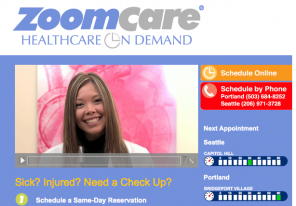 Heading to Blue Moon Burgers on Broadway, on Capitol Hill, the other day, I passed a “store” called ZoomCare, that upon further inspection sold health care. Eating at burger joints always puts me in the mindset to research low-cost health care options, so I resolved to take a look at this interloper once back at the office.
Heading to Blue Moon Burgers on Broadway, on Capitol Hill, the other day, I passed a “store” called ZoomCare, that upon further inspection sold health care. Eating at burger joints always puts me in the mindset to research low-cost health care options, so I resolved to take a look at this interloper once back at the office.
Founded by two dollar-squeezing Portland doctors in 2006, ZoomCare tries a slightly different approach than Seattle’s Qliance, when it comes to offering the range of primary care that most people need, and for which a hospital visit is overkill, if you’ll pardon the expression. Where Qliance charges a month-to-month “membership” fee (ranging from $64 to $89 per month for adults on its Level 1 plan, after a one-time $99 registration), ZoomCare is completely a la carte.
For an office visit for illness, injury, or checkup, it’s $99 if you pay cash (they’re also an in-network resource for a range of insurers, as well, in which case it’s just a co-pay or deductible). You can schedule a 15-minute appointment online, and can walk in and get seen at that moment. If that’s too much trouble, you can also get a Skype consult for $49. (ZoomCare suggests this option for: “Sore throat, bladder infections, urinary tract infections, rashes, skin infections, sinusitis, pink eye, sprains, swimmer’s ear, minor headaches, upper respiratory infections, allergies, bronchitis, minor diarrhea, vaginal yeast infections, acne, cold sores.”)
Qliance, founded in resistance to the middleman waste inherent in the insurance system (“Oh! See him transferring administrative costs to me? Help! Help! I’m being cost-externalized!”), spends more time educating clients on high-deductible and health savings account strategies. While they are also focused on seeing the patient on schedule, the membership model is supposed to create an unrushed atmosphere, where your doctor takes the time really to see you.
The ZoomCare clinics have been popular in Portland, springing up everywhere. (Qliance now has clinics in downtown Seattle, Kent, Mercer Island, Mill Creek, and Tacoma, and is said to be “scouting clinic locations across the country.”) The low- and fixed-cost appeal is undeniable, although ZoomCare has gotten rapped for its refusal to deal with Medicaid, and for over-working staff. They are not the Country Doctor, for instance, the non-profit that provides “culturally appropriate primary health care that addresses the needs of all people regardless of their ability to pay.”
At ZoomCare’s Capitol Hill clinic (531 Broadway East, Suite 10), you’ll see David Feig, MD, Erin Grindle, PA-C and Katie Shaw, ARNP, for everything from asthma and ear infections to sprains and cuts. In short, it’s all the little things you might let progress to becoming a serious thing because of the high cost of health care, and the concomitant insecurity about how much this is all going to cost, which you often find out after the fact in a hospital setting, when you’re already on the hook for it.
All this is good on paper, but with health care, the main thing is that it actually work for you, and there’s nothing like first-person experience to determine if that’s the case. One thing that Yelp reviews make clear is that they are not an emergency room–if it is serious, they are not your first choice. (Qliance’s coordination with needed hospital care may be differentiator here.) But for minor in-and-outs, the price seems to be right.
